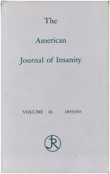The contribution of neuropsychology to psychiatry
Abstract
OBJECTIVE: Neuropsychological test data are applied with increasing frequency in research studies and clinical practice in psychiatry. This article addresses three popular assumptions about neuropsychological test data and describes the limitations and contributions of neuropsychological assessment of patients with psychiatric disorders. METHOD: All research articles from major journals in psychiatry and clinical psychology since 1991 that focused on neuropsychological assessment of psychiatric patients were reviewed. Other journals and earlier studies were reviewed selectively. RESULTS: Neuropsychological test data have made significant contributions to the development of hypotheses about abnormal brain structure and function in patients with psychiatric disorders, yet many findings from neuropsychological assessments of psychiatric patients are misinterpreted. The extent to which neuropsychological test data in psychiatric populations can be interpreted to reflect abnormalities in brain structure and function is frequently exaggerated, as is the ability of neuropsychological measures to serve as specific cognitive probes in imaging studies of physiological activation. On the other hand, the utility of neuropsychological test batteries as measures of the patterns of cognitive strength and deficit in individuals with specific psychiatric disorders is frequently underestimated. CONCLUSIONS: In addition to testing models of regional brain dysfunction in psychiatric disorders, neuropsychological tests can provide researchers in psychiatry with an improved understanding of the relation between central cognitive impairments and symptoms and serve to identify cognitive predictors of course of illness, and they may provide a method for discriminating among heterogeneous forms of some psychiatric disorders. Clinically, neuropsychological test data can be used to develop treatment strategies tailored for an individual's specific cognitive strengths and deficits.
Access content
To read the fulltext, please use one of the options below to sign in or purchase access.- Personal login
- Institutional Login
- Sign in via OpenAthens
- Register for access
-
Please login/register if you wish to pair your device and check access availability.
Not a subscriber?
PsychiatryOnline subscription options offer access to the DSM-5 library, books, journals, CME, and patient resources. This all-in-one virtual library provides psychiatrists and mental health professionals with key resources for diagnosis, treatment, research, and professional development.
Need more help? PsychiatryOnline Customer Service may be reached by emailing [email protected] or by calling 800-368-5777 (in the U.S.) or 703-907-7322 (outside the U.S.).



